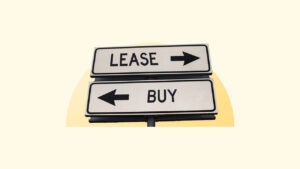New vs. used car value: Navigating the current car market

As we navigate through 2024, the economic landscape continues to shape the automotive market, particularly affecting the decisions of car buyers. The increase in the average price paid for new cars—up 48 percent from a decade ago—has made cost-efficiency a significant concern. This has had a ripple effect on the car insurance market, where the value of a vehicle greatly influences insurance premiums. Typically, new cars, with their higher value, might carry increased insurance costs compared to older models, which could be a key consideration for budget-conscious buyers.
On the other hand, while used car prices are gradually declining from their pandemic highs, they remain elevated, which may lead you to reconsider the traditional appeal of buying used. The high interest rates, notably peaking for used car loans, have also turned potential buyers towards new cars, which often come with more attractive financing options. This shift is crucial for understanding insurance trends, as newer vehicles might also come with advanced safety features that could lower insurance costs, despite their higher initial price. Making an informed choice in today’s market requires weighing these factors carefully, considering both the immediate financial outlay and the long-term costs like insurance, which are invariably tied to the car’s depreciation and retail value.
In this guide, we explain what you need to know before selling or trading in your used car, and how the cost of your car insurance is affected by the value of your vehicle. We’ll also talk about when used car prices are expected to drop based on expert analysis, which can help you decide if now is the best time to buy, sell or trade in.
Car sales statistics
In recent years, the U.S. car market has faced significant disruptions, primarily due to a global semiconductor chip shortage triggered by the COVID-19 pandemic. This shortage led to reduced vehicle production and forced some automakers to omit advanced features like crash avoidance technology.
Presently, the new car market is showing signs of stabilization with more reasonable pricing and better inventory levels, potentially easing the buying process. However, the used car market remains less predictable, with prices still above historical averages but on a downward trajectory. These market conditions are influencing not just the purchase prices but also the ongoing costs, such as car insurance, which tends to vary with the vehicle’s value and the cost to replace or repair it.
- Full-year 2024 U.S. car sales are forecasted to reach 15.7 million units, reflecting ongoing recovery in the automotive sector. (Findthebestcarprice.com)
- U.S. car sales in 2023 increased by 11.6 percent to an estimated 15.5 million units compared to 13.9 million in 2022. (Findthebestcarprice.com)
- Used car prices are anticipated to stabilize in 2024 after significant fluctuations during the pandemic. (Findthebestcarprice.com)
- New car prices saw a decrease of 3.5 percent from their peak in December 2022, with an average price of $44,331 in October 2023. (Findthebestcarprice.com)
- The Ford F-Series, Chevy Silverado and Ram Pickup were the top-selling trucks and SUVs in 2023, highlighting their dominance in the U.S. market. (Findthebestcarprice.com)
- The Tesla Model Y and Toyota Camry led as the top-selling cars in 2023, indicating strong consumer preference for both electric and traditional vehicles. (Findthebestcarprice.com)
- Total new-vehicle sales for March 2024 are expected to exceed 1.52 million units, a significant increase of 12.1 percent from the previous year. (National Auto Dealers Association – NADA)
- In March 2024, average transaction prices for new vehicles were projected at $44,186, down 3.6 percent from the previous year, with increased incentive spending per vehicle. (NADA)
- The average buyer paid $47,218 for a new vehicle in March 2024, a nearly two-year low, reflecting the dynamic pricing environment in the new car market. (Kelley Blue Book – KBB)
- Used car listings averaged $25,540 at the end of March 2024, showing a 4 percent decrease from the year prior, influenced by seasonal buying patterns during tax return season. (KBB)
- Prices for used electric vehicles (EVs) decreased to an average of $37,000 in 2024, indicating increased accessibility of EVs in the used car market. (Findthebestcarprice.com)
What your car is worth in 2024
Understanding what your car is worth in 2024 is important whether you’re considering selling or trading it in. Given the fluctuations in the automotive market, the value of your vehicle might not align with your expectations. The resale value is influenced by factors such as the car’s age, make, model and condition, but also by the method you choose to sell it.
Selling options vary, and each can affect the final price you receive:
- Local dealerships: These can offer a straightforward way to sell your car for cash, even if it isn’t a brand typically sold there. This method can be convenient but may not always yield the highest offer.
- Online dealerships: Platforms like Carvana simplify the process by handling most of the sale online, with someone often coming to your location to pick up the vehicle. This can be a less stressful option but you should compare offers as they can vary.
- Facebook Marketplace and Craigslist: These platforms allow you to handle the sale directly with the buyer, potentially helping you get a better price since there are no middlemen. However, this method requires more effort from you in terms of marketing and negotiation.
If you’re looking to replace your vehicle, trading it in is another route. This is generally more straightforward than selling, as the trade-in value directly contributes to the purchase of another vehicle. However, it’s important to note that trade-ins typically offer a lower financial return than a direct sale. Given the recent high cost of new and used cars, carefully consider if trading in offers the best financial outcome. Always compare trade-in offers from multiple dealers to ensure you’re getting the best deal.
Lastly, always weigh the pros and cons of each method to determine what best suits your financial and personal needs in the current market climate.
Selling a new car vs. used car
| Selling a new car | Selling a used car | |
|---|---|---|
| Pros | Typically commands a higher sale price. Dealerships are often willing to pay premium prices for nearly new vehicles. Could provide a quicker and more lucrative sale, especially if the make and model is in high demand. |
The used car market may offer broader opportunities to find buyers. High demand for more affordable vehicle options Does not need to be in perfect condition. |
| Cons | Outstanding loans must be settled prior to sale, which can complicate the process. Custom upgrades and luxury add-ons rarely recoup at full cost. Even if very new, cars typically depreciate quickly, so you’re unlikely to get full purchase price. |
Older cars may require additional investment to make them marketable, The financial return on selling a used car can be uncertain and significantly affected by the vehicle’s age, condition and the timing of the sale. Market fluctuations can also impact the amount a used car will fetch. |
Trading in your car vs. selling your car
| Trading in your car | Selling your car | |
|---|---|---|
| Pros | Straightforward process that saves time by letting the dealership handle the details. When upgrading to a new vehicle, the trade-in value can directly offset the cost of your purchase. You typically only pay sales tax on the net difference, potentially saving money if the trade-in value is substantial. |
Selling your car independently often results in a higher financial return. You have the flexibility to sell on your own timeline. The availability of multiple platforms, both online and in-person, facilitates getting multiple offers, ensuring you can secure the best deal. |
| Cons | Negotiating with dealers can be challenging, and you might find it difficult to get the best price. You’re generally required to buy another vehicle from the same dealership, which can limit your options. Not an option if you are not considering buying another car. |
Private sales involve more effort, including negotiations, test drives and paperwork. Can be time-consuming access to the funds could be delayed. If you rely on a vehicle daily, you’ll need to coordinate the sale timing with the acquisition of your next car. |
When will used car prices drop?
Predicting when used car prices will drop is challenging due to various market factors, but current trends indicate some stabilization and potential decreases in prices. In the fourth quarter of 2023, the average transaction price for used cars was reported at $28,371, reflecting a 4.4 percent decrease from the previous year, suggesting a trend toward more affordable used car options as market conditions stabilize.
Several factors are influencing the used car market dynamics:
- Inventory levels and demand: While the overall supply of used cars has been constrained, resulting in sustained high prices in recent years, there is evidence that prices are beginning to normalize as inventories rebuild and demand adjusts. Increased new car production is also helping to ease price pressures on used cars by providing more buying options.
- Interest rates: High interest rates have been a significant factor, making financing more expensive and potentially slowing down the purchasing process for used cars. This could continue to impact buyer behavior and used car pricing in the short term.
- Market predictions for 2024: Experts suggest that used car prices may continue to fall closer to pre-pandemic levels as new car inventories increase, which could lead to more competitive pricing across the market. However, the extent and speed of these price changes will likely vary by region and vehicle type.
While precise predictions are difficult, trends indicate a gradual easing of used car prices as the market continues to recover from recent disruptions. Buyers might find better deals in 2024 as market conditions improve but should remain mindful of the broader economic factors, including interest rates and inventory levels, that could influence prices.
How car value affects insurance rates
The value of your car significantly influences your insurance premiums, guided primarily by its actual cash value (ACV). This valuation takes into account various factors such as depreciation, age, mileage and any history of accidents or repairs, setting the stage for how much you’ll pay and what you’ll get from insurance payouts.
Among the factors that impact your cost for car insurance, the specifics of your vehicle play a crucial role. Features that enhance safety or reduce theft risk, like advanced anti-theft systems and robust safety features, could lead to discounts on premiums, whereas luxury vehicles with high-cost parts might drive up costs due to higher replacement prices.
It’s important to tailor your car insurance coverage to match the worth of your vehicle. Ensuring you have comprehensive coverage is prudent, especially if your vehicle is newer or holds significant value. Exploring options like full coverage insurance or policies with new car replacement can offer additional security. When shopping for insurance, reviewing and comparing offerings from the best car insurance companies can help you find a policy that balances cost with coverage, effectively protecting your automotive investment according to its value.
How the current cost of living influences car buying choices
As of March 2024, the Consumer Price Index (CPI) reported a 3.5 percent increase over the past year, indicating a steady cost of living increase in 2024, including the automotive sector. This slight uptick in inflation influences purchasing power, which in turn affects car buying decisions.
For instance, notable changes in the CPI included:
- Shelter and energy costs: Increases in the shelter index and a 1.1 percent rise in the energy index in March, particularly gasoline, directly affect the cost of owning and operating a vehicle.
- Motor vehicle insurance: With motor vehicle insurance indexes rising, the ongoing cost of owning a car becomes pricier, influencing buyers to consider the long-term financial impact of their purchase.
Given these economic shifts, you might find used vehicles more attractive as they generally come with lower initial purchase prices and insurance costs, making them a more feasible option amid rising living expenses.
Maximizing your vehicle investment amid cost of living increases
Choosing between a new and used car often hinges on the total cost of ownership, especially in the current economic climate where cost of living increases continue:
| Buying a used car | Buying a new car | |
|---|---|---|
| Pros | Often more cost-effective, allowing for the purchase of a higher-spec model for the same cost as a new, lower-spec model. Initial depreciation has already occurred, meaning the investment retains more value proportionally over time. Insurance costs for used cars are typically lower. |
New cars offer the latest technological innovations, which could provide a more comfortable and secure driving experience. Full manufacturer warranties could cover significant repairs and defects for several years. Can customize features, including color, trim and tech add-ons. |
| Cons | May require more frequent repairs and maintenance. Often come with limited or no warranty, posing a risk of significant out-of-pocket expenses. The car’s might be unclear, raising concerns about its reliability and longevity. |
Considerably more expensive upfront and depreciate quickly. The higher purchase price also generally means higher insurance premiums. Options and variety may be more limited than with used cars. |
As you navigate vehicle purchasing decisions in 2024, understanding the interplay between car values, insurance costs and broader economic conditions—including the current cost of living—is crucial. Taking a comprehensive approach helps ensure that your choices not only meet personal needs and preferences but also reflect economic realities, helping you make informed decisions that fit their financial situation.
Why we ask for feedback Your feedback helps us improve our content and services. It takes less than a minute to complete.
Your responses are anonymous and will only be used for improving our website.
You may also like

Pros and cons of leasing vs. buying a car

Average car payments in 2025: What to expect

What to know when buying a car



